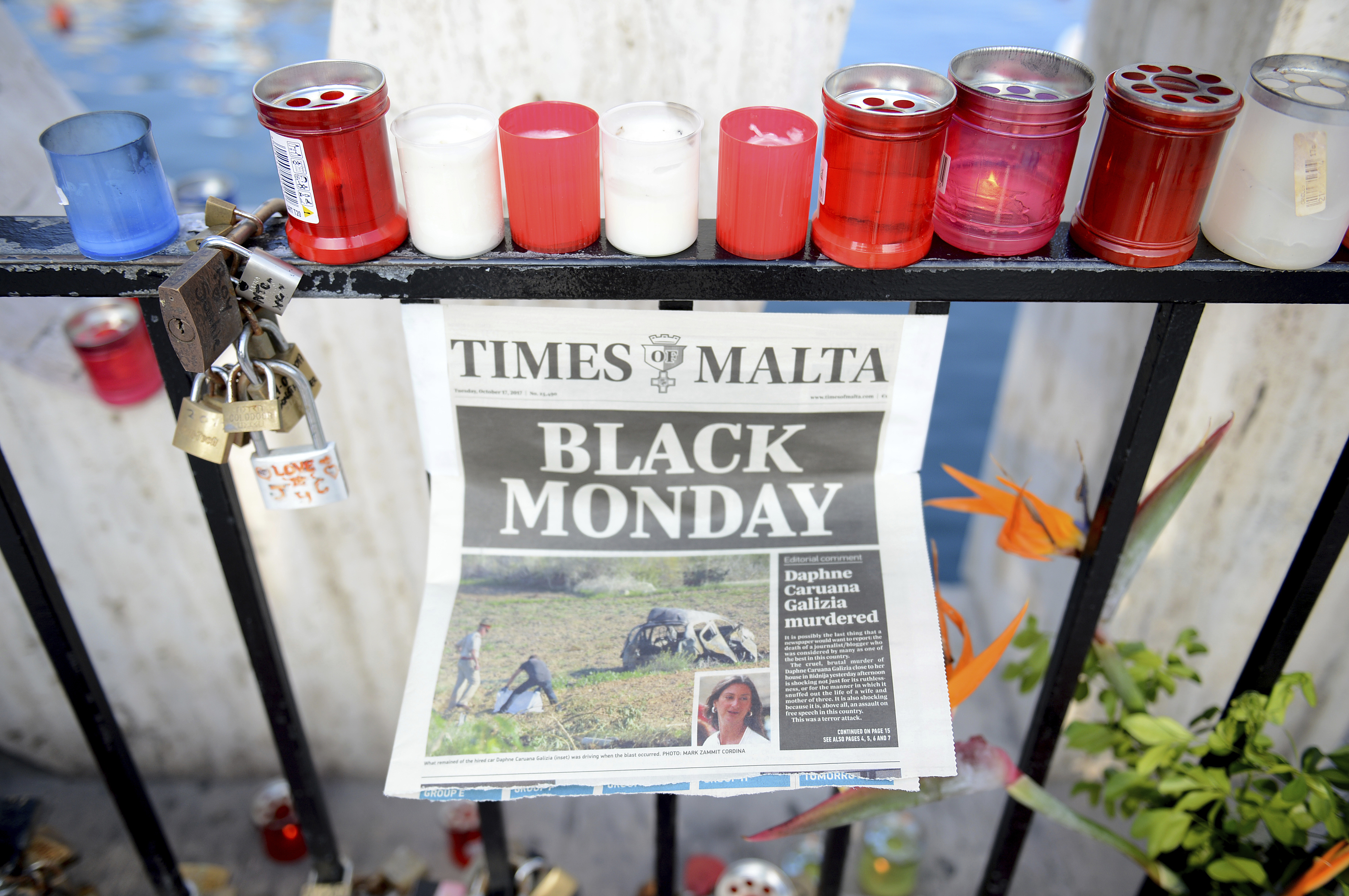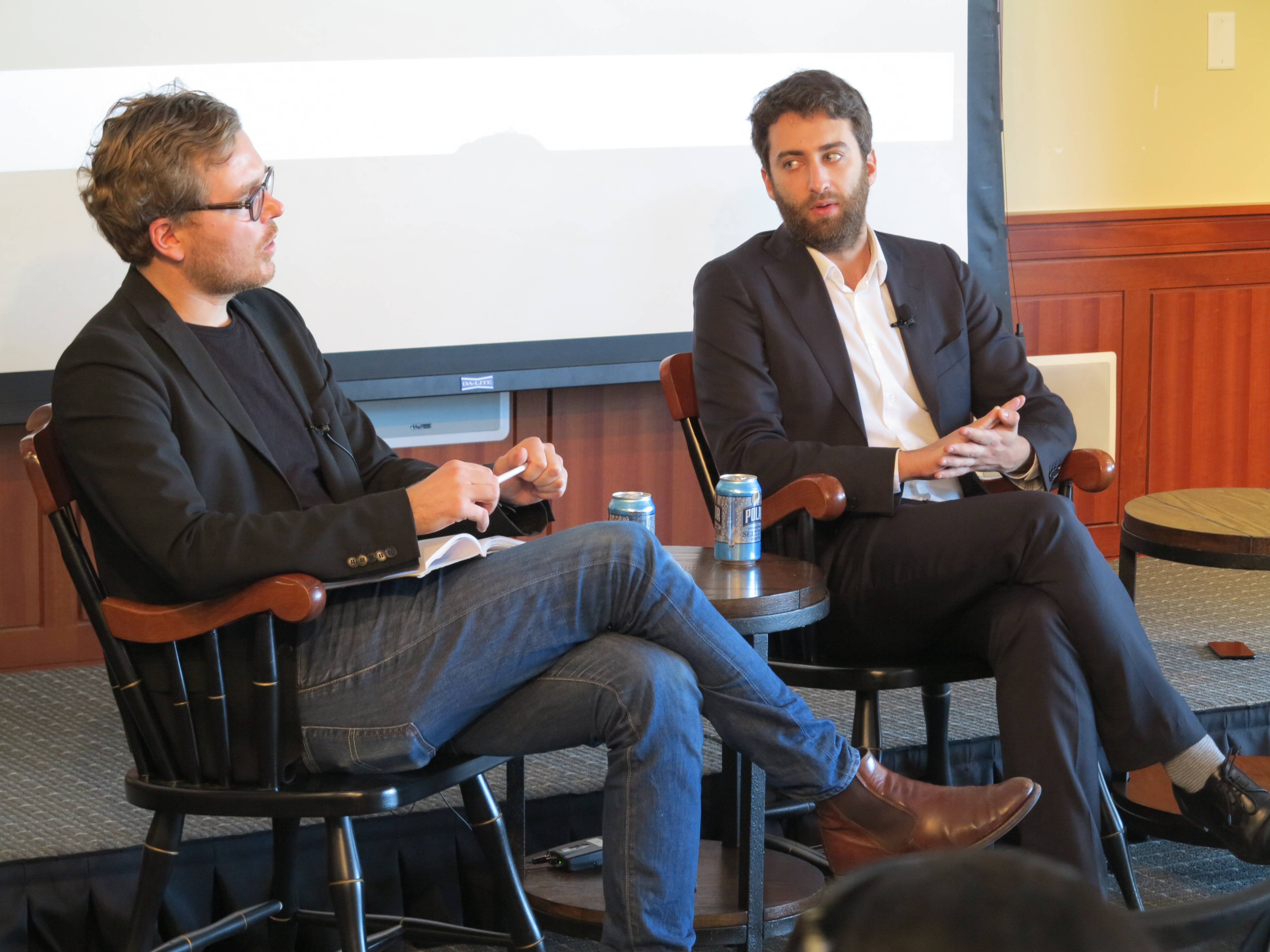
Candles, notes and paper cuttings lie next to the Love Monument in St. Julian, Malta on October 17, 2017, the day after investigative journalist Daphne Caruana Galizia was killed with a car bomb
Matthew Caruana Galizia is a data journalist and software engineer at the International Consortium of Investigative Journalists (ICIJ). He is a founding member of ICIJ’s data and research unit, which was key to the organization’s Pulitzer-winning investigation of the Panama Papers in 2016. Prior to joining ICIJ, Caruana Galizia worked at the Financial Times’s FT Labs and was a member of the investigative team at La Nación newspaper in Costa Rica.

Matthew Caruana Galizia, right, speaks with Frederik Obermaier during a visit to the Nieman Foundation in February
Caruana Galizia is the eldest son of Daphne Caruana Galizia, the Maltese journalist who was assassinated in a car bombing near her home on October 16, 2017. Her blog, “Running Commentary,” was a leading source of investigative journalism in the island nation, which, with a population of under 450,000 people, is the smallest—and most densely populated—member of the European Union. Caruana Galizia—who long faced libel suits and physical threats for her work—single-handedly investigated everything from abuse of power and ethical failures to money laundering, corrupt politicians, and the influence of the Azerbaijani government on Maltese politics. She uncovered the many Malta connections in the Panama Papers investigation—even prior to the April 2016 publication of stories based on the leaked documents—including those of politicians Konrad Mizzi and Keith Schembri.
Authorities arrested 10 people in connection with her assassination, three of whom are being processed for indictment, but who ordered the contract killing remains unknown.
Caruana Galizia visited the Nieman Foundation in February and discussed his mother’s work, the investigation into her murder, and the legal threats facing Maltese journalists.
Edited excerpts:
On his mother’s last words
The last sentence my mother wrote on her blog was, “There are crooks everywhere you look now. The situation is desperate.” She meant that, as an investigative journalist, she was standing alone. The institutions of the state had been captured, compromised, and rendered ineffective, so even though she was putting the results of her investigations out there, no action was being taken. She didn’t have the backing of any institution.
If you look at what’s happening in Israel now with Prime Minister Benjamin Netanyahu, at least the police haven’t been compromised and they’re still pushing for a prosecution. Whereas, when my mother was alive and now currently, that wasn’t the case. There was no one pushing for any kind of action on any of the things that she was revealing. This meant that she was alone and exposed.
She had no one in parliament, no one within the police, no one within the judiciary who was willing to take any action. [This] meant that, if you wanted to stop this pressure, then all you had to do was get rid of her. Even the opposition party had been completely compromised.
On his mother’s approach to reporting
Malta has no system for teaching critical thinking in the way that a country like the U.S. does. People are not taught to avoid taking things at face value. People are used to taking statements in the newspaper by politicians and not reading anything into them.
My mother never did that. She always read between the lines of everything and always saw that there was a reason for most things that happen. She had studied archaeology, and one of the things that she learned is that the absence of evidence is not evidence of absence. It was her personal motto, an axiom that she used in her work, and it was missing from the way a lot of Maltese journalists worked. They said, “OK, if there’s no evidence in plain sight that anything bad is going on here, then nothing bad is going on.” There was no instinct to look further.
On why Malta is so little covered
I think it’s a combination of things. It’s a very small country that people aren’t used to paying attention to. Malta has this image as a holiday destination. People aren’t looking at it in the same way that they look at, for example, Sicily, where there’s a lot of organized crime. The second thing is that it’s been very easy for the current government of Malta to project an image of the country that is very different from the reality.
I think that the current prime minister is a kind of populist in disguise. It’s very easy to look at countries like Poland now and see that something is going wrong there, because they fit the model of being far right, homophobic, anti‑Semitic, and anti‑media freedom. They fit this model that we’re very used to, whereas Malta’s prime minister is a little different. While he’s unfriendly to the free press and xenophobic and so on, he’s projected this image of Malta as a country that’s pro‑gay rights, for example. That creates a smokescreen for the country, and it’s very effective. It’s hard for people outside the country to look beyond that.
I was in Paris around the time of the last elections in Malta in June 2017, and I was speaking to someone from the OECD [the intergovernmental Organisation for Economic Co-operation and Development]. She told me, “Well maybe it’s good that this prime minister wins the election again—he seems like quite a good guy.” It was a real shock to me to hear this, because all his outward propaganda of being in favor of some civil rights has worked, and no one could look beyond that to see all the corruption that was happening below it.
On the investigation into his mother’s murder
The past couple of months have been like watching two disasters unfold in slow motion. The first was the assassination itself—you could see it coming from a mile off—and the second was what happened afterward with respect to the police investigation.
It fits the model of other assassinations of journalists elsewhere, like with Russian journalist Anna Politkovskaya. I think a few months after Politkovskaya was killed, they hauled in five Chechens who looked like they had just been taken off the street, all wearing tracksuits. They were clearly not the people who wanted to kill her. Even if they were the people who coordinated the assassination, they definitely had no motive other than being paid.
With my mother, it was so similar. The three people charged with her murder—whom she had never written about, and they probably had never even read anything she wrote—were very low‑level criminals, and the government declared victory after they arrested them.
My brothers and I worked very hard to put international pressure on the government to keep the investigation open. After an event we had at the Council of Europe in January, Malta’s minister of home affairs made the first public statement that they would continue looking for the mastermind. It was the first time that they had ever used that word, and it was only due to the international pressure. Still, they’re very keen to sell this as a kind of closed case, because of course it looks terrible when a journalist is assassinated in your country, especially if she was investigating state‑level corruption.
Officials are very keen to make it seem as though she was investigating something related to drug trafficking, which is what these criminals were involved in, and she wasn’t. She wasn’t working on anything related to that.
The thing is, her assassins didn’t just kill her. It was a complete act of impunity. They blew up her car 200 meters from our home in broad daylight. The explosion was powerful enough to blow the car 200 meters into a field. They were sending this message, “We can do this and we can get away with it.”
One of the best ways of thinking about suppression of a free press isn’t as a freedom of expression issue, but rather as a failure of the state and a human rights issue. If journalists get threatened, it’s a sign of deeper problems in the country.
On legal threats facing Maltese journalists
The funny thing is that Maltese journalists seem to be more afraid of what precedes the assassination, which is all the libel suits. This happened with my mother; the threats ramped up from all directions.
There were the arrests, the libel suits, the intimidation, and so on, then the assassination. What used to be most frightening to the Maltese journalists, because all of this is very new to them, is the threat of libel damages.
Maltese newspapers are very small. They each employ fewer than 50 people, their lawyers are very conservative, and they don’t have any kind of international backing. In this case, these banks which they and my mother were reporting on were threatening them with libel suits, filed both in the U.S. and the U.K., worth $40 million in damages. That’s enough to shut down a newspaper.
Even the cost of fighting the libel suits in D.C., for example—which is where they were threatening to file them—would have put them out of business.
It’s extremely insidious because other journalists don’t know that big law firms are threatening multiple media outlets, not just targeting them specifically. Let’s say there are three competing newspapers in your city. The way these companies would work is first they would send the letters to one newspaper, get them to remove the articles about their business. When they’ve succeeded, they move on to the other one and after that the third one.
At no point does any of the three newspapers find out what is happening at the other newspapers. The firms take advantage of the fact that newspapers don’t talk to each other about these things and don’t publish the letters.
The letters normally come with empty threats saying that more suits will be filed if the letters are published. There is no legal basis for that. The law, in most countries, says that as soon as a letter is put in the mail, it becomes the property of the recipient. The recipient can do whatever they want with it. The threats are completely empty. It’s common, for example, if you write a single article about a bank, to receive letters from three different firms about that single article.
Sadly, journalists have come to look at this as a kind of occupational hazard which I think is completely unacceptable. You shouldn’t accept this as a condition of your work. In no other field does any professional accept daily legal threats as a kind of condition of their employment.
On The Shift’s potential as a game changer
The Shift, a new media outlet funded after my mother’s assassination, is made up exclusively of investigative journalists. It’s the first time anything like this has ever been set up in Malta. The journalists left their previous jobs and the business is operating mostly via small private donations.
When they’ve been threatened with libel suits, they’ve published the legal letters. That’s the first time any Maltese journalist apart from my mother has ever done this.
They published the threats on their website saying, “Look, we’ve received this threat saying that a libel suit will be filed unless we remove these articles, and we think it’s our duty to inform our readers.” I think this is a good move because it shows readers what’s happening and what the journalists are risking.


